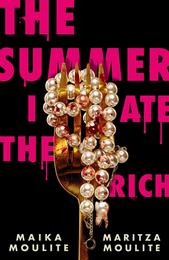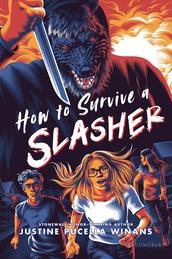
|

|
Maika Moulite is a Miami native, the daughter of Haitian immigrants, and a doctoral student at Howard University. She's the eldest of four sisters and, when she's not writing, loves listening to audiobooks, journaling, dancing, and singing at the top of her lungs. Maritza Moulite graduated from the University of Florida with a BA in women's studies and the University of Southern California with an MA in journalism. The Moulite sisters have written two previous YA novels together: Dear Haiti, Love Alaine and One of the Good Ones. Their first work of YA horror is The Summer I Ate the Rich (Farrar, Straus and Giroux).
Justine Pucella Winans is a queer and nonbinary writer who lives in Los Angeles with their husband and incredible Halloween-colored cats. Their books include the YA novels Bianca Torres Is Afraid of Everything and One Killer Problem. Their first work of YA horror is How to Survive a Slasher (Bloomsbury).
Here, Winans and the Moulite sisters discuss their first works of YA horror and how their appreciation for specific horror tropes--the final girl and zombies (zonbis)--inspired them to write new takes on those tropes.
Justine Pucella Winans: Both of our books are built around well-known horror tropes. The biggest trope that inspired me is "The Final Girl": this underdog, reluctant hero (I mean, I think even horror protagonists don't want to be in a horror story) has to come into their power to beat the Big Bad. I love an underdog, and I love a reluctant hero, but any horror fan knowns that the role of final girl took on pretty much one shape for a long time. How about you?
Maritza Moulite: The heart of our story is Brielle's identity as a zombie (or in Haitian Creole, zonbi). But the zombies we're used to in the United States are always moaning and groaning and dragging their feet and trying to eat brains. And it's been a huge part of the Western imagination for a long time--the CDC even once used a pretend impending Zombie Apocalypse to show the significance of emergency preparedness.

|
|
| Maika Moulite (photo: Lydi Ann Mary) |
|
Maika Moulite: But we're Haitian American, and the idea of zombies originally came from Haitian culture: the enslaved people were terrified of becoming zonbi and being forced into eternal servitude--slavery even in death. Brielle is Haitian and American so the way she shows up as a zombie is inspired by the original version and the one Hollywood and American sociologists made up.
Winans: In How to Survive a Slasher, I played with the idea that the Final Girl role isn't limited to gender and showed that anyone can be the hero (especially if you're desperate enough). My protagonist is a genderqueer bisexual whose late father was a Final Girl. CJ just wants to be ignored, but all the characters in roles that would normally be considered small supporting or background roles in a traditional slasher are forced into the leading roles. So, the story still follows the general plot beats of slasher movies and books before it, but it's also aware of these conventions and (lovingly) pokes fun at them. It's definitely campy and meta to explore all these tropes in a story, but I had a lot of fun with it.
Maritza Moulite: Yes! We had the title of the book and the start of an outline, but something still felt like it was missing. Then it came to us: What if Brielle literally ate the rich?
We're so glad you had a fun time writing How to Survive a Slasher, Justine. We're dying to know, though: do you think you would survive a slasher?

|
|
| Justine Pucella Winans (photo: ZAW Photography) |
|
Winans: I think my only shot in terms of survival is that I watch and read a lot of horror! I hope that (and my limited knowledge of Brazilian jiu-jitsu) would allow me to at least have a fighting chance....
Maika Moulite: We've seen the jiu-jitsu pictures on Insta--you would definitely survive!
Winans: Slasher horror is the type of horror where I feel I'd have the best survival chance because most of the time, it's just another person who is the big bad. If it came to any apocalyptic scenario, I'm pretty sure I'd be one of the first to go.
How do you think you'd fare in a zombie novel?
Maritza Moulite: Well, if they're Haitian zonbi and we had enough time, we might stand a chance. In Haitian lore, zonbi are made through a mixture of various secret ingredients. So, our goal would be to steadily consume the ingredients over many weeks and months, which would hopefully render the potion ineffective because we would've built up a tolerance. But! If they're zombies like the ones in The Last of Us, I would immediately turn into a zombie because I can't say no to baked goods.
Maika Moulite: I would try to appeal to any potential sense of diplomacy that they might have, and I would fail.
 |
|
| Maritza Moulite (photo: Lydi Ann Mary) |
|
Maritza Moulite: Bless her.
Maika Moulite: How was writing this book different from the other works you've published?
Winans: Slasher is my first YA horror/thriller, and my first two YA titles were more lighthearted and funny mysteries. I think Slasher has those moments, but it's really my love letter to slasher movies and fiction. I anticipated it being much more firmly in the campy horror comedy genre, but while I was drafting it, I was going through some loss in my personal life. It sort of translated into the book with my main character, CJ, exploring their own grief in a way I didn't anticipate from the initial pitch.
Maika Moulite: Yeah, we noticed that both of our books have something else in common: dead fathers. Experiencing loss in our family while we wrote TSIATR definitely seeped into our storytelling as well.
Winans: But what about you? Your previous titles aren't horror. Was the writing process different? Are there genres you would like to explore in the future?
Maika Moulite: Dear Haiti, Love Alaine was an epistolary novel, so we got to come up with fun bits of media that came together to make a story. It was like creating a puzzle and making sure we had enough pieces so the audience could see the picture. TSIATR is more straightforward prose, but we can't help but look to the past even in our contemporary works. There are lots of flashbacks to give context to what our protagonist Brielle goes through. We're open to writing any genre though! We're big romance fans--maybe we've got a love story or two to share.
Maritza Moulite: We loved Slasher. It's a unique premise and it showcases the experiences of the loved ones who have been left behind in all the true crime stories our society consumes as entertainment. Plus, it's really funny. What do you hope readers feel at the end of your book?
Winans: Thank you! I feel like there is often an expectation for books to be life changing and world shattering and if someone somehow gets that from Slasher, amazing! But I want to take readers for a ride, give them space to be a little scared or entertained, and to maybe feel smart because they guessed the ending. If someone can relate to CJ's grief or gender identity, that would be awesome, but really, I just want readers to feel like they had a fun time! What about you?
Maika Moulite: We definitely relate to wanting readers to have a fun time! We wrote TSIATR during great personal loss as we navigated our dad's illness and ultimate passing, so it was a bit of an escape for us. As Brielle processes her own grief, she makes some pretty questionable decisions that create a wild ride.
Ultimately, we want readers to be thoroughly entertained even as they question who the true monster in the tale is: Brielle or the billionaires who have all the financial power to make people's lives materially better but choose not to?

